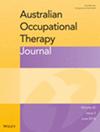Exploring the multidimensional occupational participation of young adults with developmental coordination disorder
Abstract
Introduction
Developmental coordination disorder (DCD) impacts occupational participation in adulthood, yet little is known about its multidimensional pattern (including objective and subjective dimensions). This study explores the participation patterns of adults with DCD.
Methods
Fifty-five adults with DCD aged 21–35 (51% women) completed the young adults' daily activities participation scale.
Consumer and community involvement
No consumer and community involvement were included in this study.
Results
Imbalanced patterns were noted, with a high frequency of participation but low levels of pleasure and performance in motor-related activities such as driving, cooking, and household-chores. Reduced frequency and low levels of performance, meaning, and pleasure were observed in fitness and sports, health management, shopping, bureaucratic and financial tasks, and spiritual or volunteering activities. Medium-low performance and low pleasure reported in most of the activities examined, except for interpersonal relationships and community and social life that reported with the highest level of performance, meaning, and pleasure.
Conclusions
Individuals with DCD may face participation challenges during adulthood, highlighting their need for occupational therapy services.
PLAIN LANGUAGE SUMMARY
This study looked at how developmental coordination disorder (DCD) affects young adults' participation in their daily lives. The findings show that many adults with DCD have trouble with tasks like driving, finding their way, doing household chores, and taking care of themselves. However, even though they take part in social and leisure activities less often, they still enjoy these activities. Understanding these challenges can help create better support services and strategies for them. For example, occupational therapy can help people develop skills to perform daily tasks and enhance their enjoyment levels and confidence in performing these activities, leading to improved wellbeing.


 求助内容:
求助内容: 应助结果提醒方式:
应助结果提醒方式:


